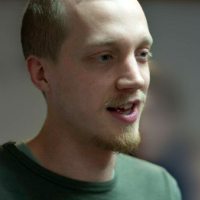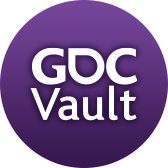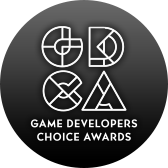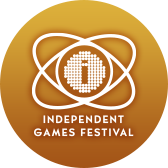Jonatan Van Hove -- or Joon, to his friends -- is a game designer who can't seem to stop working.
In addition to his work as a game development teaching assistant at the IT University in Copenhagen, Van Hove is a prolific independent developer who makes games with both his indie group Glitchnap and the larger Copenhagen Game Collective. Glitchnap recently launched their browser-based endless runner Try Harder on Adult Swim Games, and earlier this year the group released their local multiplayer agme LAZA KNITEZ!! on Ouya.
Van Hove is also heavily involved with the Nordic indie development community, having helped found the Free To Play: Indie Games Expo in Belgium and most recently cohosted the Nordic Game Conference in Sweden.
In August he's coming to Germany to help host the first-ever European Innovative Games Showcase -- which includes titles like Bounden, Superhot and Perfect Woman -- at GDC Europe 2014 in Cologne, an event that aims to shed light on some of the most interesting games to come out of the region. We recently got in touch with Van Hove to learn more about his experience as an indie developer and his inspiration for working to establish the European Innovative Games Showcase.
How did you get involved with the European Innovative Games Showcase, and why?
JVH: A day before the submission deadline of GDC Europe I was wondering why so many indie and non-indie game development gatherings take place in the United States. It seems that every mildly successful European games studio must travel to America to get recognition. I think that's sad, and needlessly straining.
I started thinking of something I could do that would give European devs a platform for recognition, networking and whatever else in Europe. I took a lot of inspiration from the GDC Experimental Gameplay Workshop in San Francisco, wrote up a strong pitch and submitted it to GDC Europe. I told them I would love to help however I can, spread the call for submissions, find curators, organize the curation, and host the show, if GDC Europe would be interested in such a showcase.
Turns out they were -- before we knew it we had 150 submitted games, and the organization and curators put some serious weight behind it to make it all happen. I'll gladly take credit for the idea, but the workload was shared between me, the curators, and the GDC Europe organization.
So what do you hope it does for both the featured developers and GDC Europe as a whole?
Getting into game development just a few years back was one of the most fulfilling things that ever happened to me, mostly thanks to the amazing people I've met through it. It's my ambition to return that favor in any way possible, and this showcase is a part of that.
I also think that developer showcases that aren't about pitching the game, but rather reveal some of the intentions or inner workings, are generally some of the most inspiring sessions at conferences, so I look forward to getting inspired.
For the developers I hope they'll get fulfillment out of it, in whatever shape they desire or require it. They'll get to present their game in front of the attendees at GDC Europe, which could easily include journalists that get inspired to do a feature, or publishers that could offer a partnership, or platform holders, or investors, or acquire new fans, or event organizers, or anything. If nothing else, it's always good training for developers to prepare a presentation of their game.
European developers don't always get the same attention as those in North America. What unique challenges do you think independent developers face in Europe?
I can only speak about Denmark, which is where I've lived for the last 3 years. A lot of really great experimentation with the medium comes from Europeans. The Experimental Gameplay Workshop consisted of about 50 percent European teams, and the IGF usually has a strong European representation as well, so I'm not sure it's fundamentally that different.
From my limited understanding, we have much better social welfare in most countries as well as education and funding opportunities, which to me just means that we get to mess around more with lower risk. It is noticeable that all console manufacturers and most marketplaces all exist in the US, which is an extra strain on any European indie who wants to live off of their games.
I feel like European developers are very fragmented, probably due to language and culture, and the everyday discussions about games are led by Americans -- with the Brits following behind them. For most Europeans, the majority of the conversation on Twitter, blogs and press is in their second language, raising the threshold for participation. It;s also notable that the majority of independent developers come from northwestern Europe. Game events in Europe aren't just a meeting of other developers -- they're a significant intercultural experience.
I think it would benefit all of us to create a stronger European network, focused on creating better situations for ourselves as well as our neighbors. Each country has its own systems, yet we can still learn a lot from each other, so getting and staying connected, on a local, a national, a European and a global level is really important but requires a lot of energy.
Why do you think GDC Europe needs its own Innovative Games Showcase, in addition to the established GDC event?
Last year I got to attend both GDC and GDC Europe for the first time. GDC in San Francisco was filled with a large number of amazing people, and I became part of a network of weak and strong ties between the global game developers spiderweb. I met people there who I today feel comfortable calling friends, people I've done projects with or people I had only met through Twitter before.
I hope GDC Europe, even though it's the smaller cousin, can do the same closer to home. I also hope that the EIGS contributes in some way to the growing European games community, gives the developers some much deserved recognition in their home base, and creates stronger ties between everyone present.
I'd like to thank everybody who submitted a game, as well as the curators who helped boil it down to a shortlist of 9 games. There were so many more amazing games we would've loved to give the stage to, but of course time is limited. Keep working on the fringe, keep innovating and experimenting, and keep submitting to the EIGS -- if they will have us again next year!
[GDC Europe 2014 attendees can still register to see the first-ever European Innovative Games Showcase and check out the current session lineup via the conference's Session Scheduler.
Organized by UBM Tech Game Network, GDC Europe, now in its sixth year in Germany, will run Monday through Wednesday, August 11-13 at the Congress-Centrum Ost in Cologne, Germany, co-located with Europe's biggest video game trade and public show gamescom. early birds can still register by July 16 to save 200 euros on an All Access Pass.]
Gamasutra and GDC are sibling organizations under parent UBM Tech.



